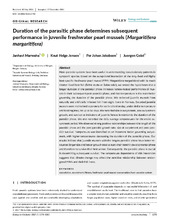| dc.contributor.author | Marwaha, Janhavi | |
| dc.contributor.author | Jensen, Knut Helge | |
| dc.contributor.author | Jakobsen, Per Johan | |
| dc.contributor.author | Geist, Jürgen | |
| dc.date.accessioned | 2018-03-27T11:33:31Z | |
| dc.date.available | 2018-03-27T11:33:31Z | |
| dc.date.issued | 2017-03 | |
| dc.Published | Marwaha J, Jensen KH, Jakobsen PJ, Geist. Duration of the parasitic phase determines subsequent performance in juvenile freshwater pearl mussels (Margaritifera margaritifera). Ecology and Evolution. 2017;7(5):1375-1383 | eng |
| dc.identifier.issn | 2045-7758 | en_US |
| dc.identifier.uri | https://hdl.handle.net/1956/17565 | |
| dc.description.abstract | Host–parasite systems have been useful in understanding coevolutionary patterns in sympatric species. Based on the exceptional interaction of the long‐lived and highly host‐specific freshwater pearl mussel (FPM; Margaritifera margaritifera) with its much shorter‐lived host fish (Salmo trutta or Salmo salar), we tested the hypotheses that a longer duration of the parasitic phase increases fitness‐related performance of mussels in their subsequent post parasitic phase, and that temperature is the main factor governing the duration of the parasitic phase. We collected juvenile mussels from naturally and artificially infested fish from eight rivers in Norway. Excysted juvenile mussels were maintained separately for each collection day, under similar temperature and food regimes, for up to 56 days. We recorded size at excystment, post excystment growth, and survival as indicators of juvenile fitness in relation to the duration of the parasitic phase. We also recorded the daily average temperatures for the entire excystment period. We observed strong positive relationships between the length of the parasitic phase and the post parasitic growth rate, size at excystment and post parasitic survival. Temperature was identified as an important factor governing excystment, with higher temperatures decreasing the duration of the parasitic phase. Our results indicate that juvenile mussels with the longest parasitic phase have better resources (larger size and better growth rate) to start their benthic developmental phase and therefore to survive their first winter. Consequently, the parasitic phase is crucial in determining subsequent survival. The temperature dependence of this interaction suggests that climate change may affect the sensitive relationship between endangered FPMs and their fish hosts. | en_US |
| dc.language.iso | eng | eng |
| dc.publisher | Wiley | en_US |
| dc.rights | Attribution CC BY | eng |
| dc.rights.uri | http://creativecommons.org/licenses/by/4.0 | eng |
| dc.subject | coevolution | eng |
| dc.subject | excystment | eng |
| dc.subject | Fitness | eng |
| dc.subject | freshwater pearl mussel conservation | eng |
| dc.subject | host–parasite system | eng |
| dc.title | Duration of the parasitic phase determines subsequent performance in juvenile freshwater pearl mussels (Margaritifera margaritifera) | en_US |
| dc.type | Peer reviewed | |
| dc.type | Journal article | |
| dc.date.updated | 2018-01-10T10:27:20Z | |
| dc.description.version | publishedVersion | en_US |
| dc.rights.holder | Copyright 2017 The Author(s) | en_US |
| dc.identifier.doi | https://doi.org/10.1002/ece3.2740 | |
| dc.identifier.cristin | 1479417 | |
| dc.source.journal | Ecology and Evolution | |

